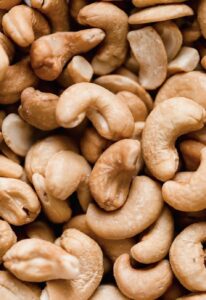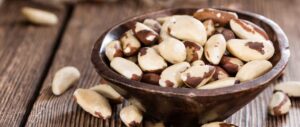What is Grazing and How to Avoid It
When it comes to eating, grazing refers to the habit of snacking frequently and irregularly throughout the day, often without realizing it—like munching on chips while watching TV, only to find yourself eating far more than planned. This constant snacking can strain digestion and make it harder to manage weight.

How to Break the Grazing Cycle
The key to stopping grazing is eating nutrient-dense foods that keep you full longer. Focus on meals rich in protein, fiber, and healthy fats:
- Protein: Reduces hunger by lowering ghrelin and takes longer to digest.
- Fiber: Slows digestion and provides lasting fullness.
- Healthy Fats: Omega-3s and other fats help delay stomach emptying.
8 Foods to Prevent Unhealthy Snacking
1. Brown Rice & Whole Grains
Whole grains, like brown rice, barley, and millet, contain complex carbohydrates and are high in fiber. Unlike refined grains, they take longer to digest, which slows the release of sugar into the bloodstream. This prevents sudden energy crashes and curbs cravings.
- How to enjoy: Pair brown rice with steamed vegetables and a lean protein like grilled chicken or tofu for a balanced, filling meal.
- Why it works: The slow digestion stabilizes blood sugar, keeping hunger at bay for hours.
2. Avocado
Avocado is rich in monounsaturated fats (such as omega-9 oleic acid) that delay stomach emptying and prevent frequent hunger pangs. Additionally, it provides fiber, which enhances satiety, and essential vitamins like potassium, which helps regulate metabolism.
- How to enjoy: Spread avocado on whole-grain toast, mix it into a quinoa salad, or add it to smoothies for a creamy texture.
- Why it works: Healthy fats keep you satisfied longer, reducing the urge to snack between meals.
3. Chickpeas & Other Legumes
Chickpeas, lentils, and beans are powerhouses of plant-based protein and fiber. They have a low glycemic index, meaning they release glucose slowly, helping to maintain steady energy levels. Their high protein content keeps you full and reduces the temptation to snack mindlessly.
- How to enjoy: Roast chickpeas for a crunchy snack, toss them into salads, or make a hearty hummus.
- Why it works: The combination of protein and fiber makes legumes effective appetite suppressants.
4. Greek Yogurt
Greek yogurt has nearly twice the protein content of regular yogurt, along with gut-friendly probiotics that promote healthy digestion. The protein takes longer to break down, keeping you full, while probiotics can improve nutrient absorption, which supports overall satiety.
- How to enjoy: Mix it with fresh fruit like berries, nuts, or a drizzle of honey for a nutritious snack or breakfast.
- Why it works: The combination of protein and probiotics promotes fullness and helps manage hunger.
5. Eggs
Eggs are a complete protein, containing all nine essential amino acids. They also reduce levels of ghrelin, the hormone responsible for stimulating hunger, making them a great choice to curb cravings. Rich in vitamins D and B12, eggs also support metabolism.
- How to enjoy: Scramble eggs with spinach and whole-grain toast for breakfast, or boil them for an on-the-go snack.
- Why it works: Eggs provide long-lasting energy and reduce hunger hormones, preventing excessive snacking.

6. Salmon & Fatty Fish
Salmon, mackerel, and sardines are high in protein and Omega-3 fatty acids, which reduce inflammation and improve mood. Omega-3s are known to regulate hunger hormones like leptin, which plays a role in feeling full. Including fatty fish in your diet can help you stay satisfied for longer.
- How to enjoy: Pair grilled salmon with roasted vegetables or add smoked salmon to salads or whole-grain bread.
- Why it works: Fatty fish regulate hunger hormones and promote sustained satiety.
7. Boiled Potatoes (with the Skin)
Boiled potatoes, surprisingly, are one of the most filling foods according to the satiety index. They are rich in resistant starch and fiber (especially when eaten with the skin), which promote gut health and slow digestion. Potatoes are also packed with potassium, an essential nutrient for regulating fluid balance and reducing bloating.
- How to enjoy: Serve boiled potatoes alongside lean proteins like fish or chicken, or mash them with a little olive oil for a healthy side dish.
- Why it works: Their high satiety index makes them effective at curbing hunger between meals.
8. Salads & Leafy Greens
Leafy greens like spinach, kale, and arugula deserve a spot on your plate. These foods are low in calories but high in fiber, helping you feel full without overloading on energy. They also contain micronutrients like magnesium, which helps regulate blood sugar and reduces cravings.
- How to enjoy: Create hearty salads with leafy greens, chickpeas, avocado, and salmon, or blend spinach into smoothies for added nutrition.
- Why it works: Greens provide volume to meals without excess calories, supporting appetite control.
The Importance of Mindful Eating
These foods are not just filling; they help create a mindful relationship with food. Mindless grazing is often triggered by emotional or environmental cues, leading to unnecessary calorie intake. Choosing nutrient-rich meals, eating slowly, and listening to your body’s hunger signals can help prevent grazing and promote better health.
EUROPEAN PERSPECTIVE
Tips on How to Stop Snacking
The term “snacking” can have negative implications for both physical and mental health. Overeating can lead to digestive issues, bloating, tooth decay, and weight gain, especially when people opt for fatty and sugary foods. Understanding the reasons behind snacking is crucial before trying to break the habit. Common triggers include:
- Hunger: A natural response when the body needs energy.
- Hypoglycemia: Consuming quick sugars can cause a rapid insulin response, leading to low blood sugar and cravings.
- Stress: Eating favorite comfort foods releases calming chemicals in the brain, creating a cycle of emotional eating.
- Boredom: Lack of stimulation can lead to eating for entertainment.
- Indulgence: Restricting pleasurable foods can lead to cravings for unhealthy snacks.
To curb snacking, it’s essential to balance meals by including:
- Carbohydrates: Foods like whole grains and legumes provide slow-digesting energy, promoting satiety.
- Fruits and Vegetables: High in fiber and water, they help delay hunger.
- Proteins: Foods like meat, fish, and eggs contribute to a lasting feeling of fullness.
- Enjoyment: Choose foods you love to avoid frustration and reduce the urge to snack later.
Additionally, structuring meals can prevent snacking:
- Three balanced meals a day: Regular eating helps stabilize blood sugar and control hunger.
- A substantial breakfast: This meal should be balanced and filling to avoid mid-morning cravings.
- Planned snacks: Healthy mid-meal snacks can satisfy hunger without leading to unhealthy grazing.
When dealing with evening cravings, differentiate between casual and compulsive snacking. To combat compulsive eating, focus on:
- Balanced dinners: Ensure meals are satisfying with wholesome foods.
- Mindful eating: Slow down and savor your food to improve digestion and reduce overeating.
- Healthy alternatives: Keep nutritious snacks available to manage cravings.
Stress management is crucial, as elevated cortisol levels can increase appetite. Incorporate stress-reducing foods rich in magnesium and omega-3 fatty acids.
If cravings strike, drink water or other low-calorie beverages to help manage the urge. Long-term strategies include avoiding sugary foods, practicing mindful eating, and even trying herbal remedies for appetite control. However, natural solutions should complement a balanced diet and healthy lifestyle, not replace regular meals.
sources: https://www.vogue.com/article/7-filling-foods-to-help-with-snacking https://www.santemagazine.fr/minceur/coaching-minceur/nos-astuces-anti-grignotage-178060



